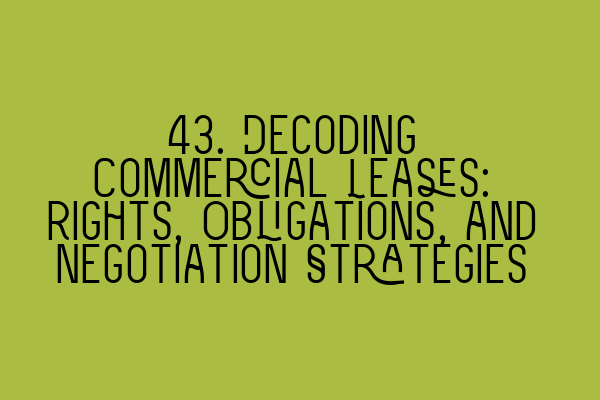Decoding Commercial Leases: Rights, Obligations, and Negotiation Strategies
Commercial leases play a crucial role in the world of property law. Whether you are a landlord or a tenant, understanding the intricacies of a commercial lease agreement is essential to protect your rights and ensure a smooth business operation. In this article, we will demystify the complex world of commercial leases, discussing the rights and obligations of both parties and providing valuable negotiation strategies. Let’s dive in!
Rights and Obligations of the Tenant
As a tenant, it is vital to be aware of your rights and obligations under a commercial lease. One of the primary rights you have is the right to use the leased premises for your business purposes. This right is usually outlined in the lease agreement and provides you with exclusive possession of the property during the lease term.
Along with the right to use the premises, tenants also have the right to quiet enjoyment. This means that the landlord cannot interfere with your business operations or disturb your peaceful enjoyment of the property. However, it is important to note that this right may be subject to certain reasonable restrictions, such as landlord’s access for repairs or inspections.
On the other hand, tenants have several obligations they must fulfill throughout the lease term. One of the key obligations is the timely payment of rent. Failing to pay rent can lead to serious consequences, including eviction. Therefore, it is essential to carefully review the rent payment terms and ensure that you have a stable financial plan in place.
Additionally, tenants are generally responsible for the maintenance of the leased premises, including repairs and upkeep. However, the extent of these responsibilities can vary depending on the specific lease agreement. It is crucial to thoroughly review the lease terms to understand your maintenance obligations and negotiate any necessary changes before signing the agreement.
Rights and Obligations of the Landlord
Landlords also have specific rights and obligations under a commercial lease. One of their primary rights is the right to receive rent from the tenant. Landlords can enforce this right through various means, including legal action if the tenant fails to pay rent.
Furthermore, landlords have the right to access the leased premises for specific purposes, such as repairs, inspections, or showing the property to potential tenants. However, this right must be exercised reasonably and with prior notice to the tenant, unless it is an emergency situation.
In terms of obligations, landlords are responsible for maintaining the structural integrity of the property. They must ensure that the premises comply with all applicable health and safety regulations. Failure to fulfill these obligations may result in legal consequences and potential liability for the landlord.
Negotiation Strategies
Commercial lease negotiations can be challenging, but with the right strategies, you can secure a favorable agreement. Here are some negotiation tips to consider:
- Engage in thorough research: Before entering into negotiations, gather as much information as possible about the property, market conditions, and other similar lease agreements. This will empower you with valuable insights and give you a better position for negotiation.
- Identify your priorities: Clearly define what is most important to you in the lease agreement. It could be rent price, lease term, maintenance responsibilities, or any other factor. Prioritize your needs and communicate them effectively during negotiations.
- Seek professional advice: Consider engaging a solicitor specializing in property law to assist you throughout the negotiation process. Their expertise and experience can help you navigate complex lease provisions and ensure that your rights are protected.
- Be prepared to compromise: Negotiations often require some level of compromise from both parties. Identify areas where you are willing to be flexible and areas where you are not. This will allow you to find mutually beneficial solutions.
- Review the lease agreement carefully: Once your negotiations are successful, thoroughly review the lease agreement before signing. Look for any hidden clauses or ambiguous terms that may cause issues in the future. If necessary, seek clarifications or amendments to protect your interests.
By following these negotiation strategies, you can increase your chances of achieving a favorable commercial lease agreement that aligns with your business needs.
In conclusion, understanding the rights, obligations, and negotiation strategies involved in commercial leases is crucial for both landlords and tenants. By grasping the intricacies of these agreements, you can protect your interests, ensure a harmonious landlord-tenant relationship, and lay the groundwork for a successful business venture.
If you want to delve deeper into property law concepts and prepare for the SQE exams, check out our SQE 1 Practice Exam Questions and SQE 1 Practice Mocks FLK1 FLK2 articles. We also offer comprehensive SQE 2 Preparation Courses and SQE 1 Preparation Courses to help you succeed in your legal career. Stay up to date with the latest SRA SQE Exam Dates for effective planning and preparation.
